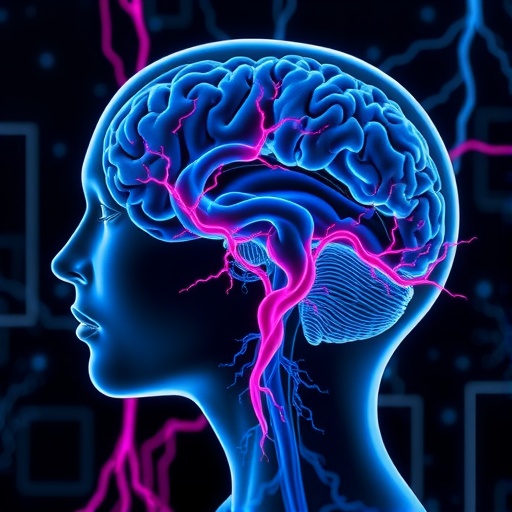In a groundbreaking investigation poised to reshape the understanding of major depressive disorder (MDD), researchers have uncovered compelling evidence of abnormalities in neurovascular coupling (NVC) within first-episode, drug-naïve MDD patients. This novel study, published in BMC Psychiatry, delves into the intricate interplay between neural activity and cerebral blood flow—an interaction fundamental to brain health and function. By leveraging advanced neuroimaging techniques, the research elucidates vital disruptions in this coupling mechanism that could form the biological substrate underlying depressive symptoms.
Major depressive disorder remains one of the most prevalent psychiatric conditions globally, exacting a profound toll on personal and public health. Despite decades of research, the pathophysiological processes contributing to symptom manifestation and progression remain elusive. The emerging focus on neurovascular coupling reflects a paradigm shift: rather than looking solely at neural activity or vascular factors separately, scientists now examine their dynamic interdependence, which ensures adequate blood supply in response to fluctuating neuronal demands.
This investigation involved a cohort of 102 participants, split evenly between 51 first-episode, drug-naïve MDD patients and 51 matched healthy controls. By utilizing arterial spin labeling (ASL) paired with blood-oxygen-level-dependent (BOLD) functional magnetic resonance imaging (fMRI), the authors measured two critical parameters: the amplitude of low-frequency fluctuations (ALFF)—a proxy for spontaneous neural activity—and cerebral blood flow (CBF). The core focus was assessing spatial and temporal correlations between ALFF and CBF to characterize NVC’s integrity across various brain regions.
Spatial correlation analysis revealed a pronounced attenuation in whole-brain ALFF-CBF coupling among MDD patients relative to healthy controls. Notably, this reduction was more pronounced in patients exhibiting severe depressive symptoms, and distinctly significant within the female subgroup. These findings underscore a sex-specific vulnerability and severity dependence in neurovascular disturbances, suggesting that MDD’s neuropathology might manifest differently across demographic strata, necessitating personalized treatment approaches.
Temporal coupling analyses provided additional layers of complexity. Moderate MDD patients demonstrated an intriguing increase in ALFF-CBF coupling specifically localized to the left insula, a region implicated in interoceptive awareness and emotional processing. Conversely, severe MDD cases exhibited a bifurcated pattern—diminished coupling in the left anterior cingulate cortex, a hub for cognitive control and affect regulation, paired with elevated coupling in the right superior occipital gyrus, a region associated with visual processing. This spatial heterogeneity hints at compensatory neural-vascular interactions that may evolve with disease progression.
Sex differences surfaced prominently, with male MDD patients showing decreased ALFF-CBF coupling in the left superior frontal orbital gyrus, an area linked to decision-making and emotional regulation. This suggests that the neurovascular dysfunction in males with MDD might localize differently than in females, further emphasizing the necessity for integrative sex-specific neurobiological models of depression.
Of particular clinical relevance, the study found a significant negative correlation between the spatial coupling of ALFF-CBF and anxiety symptom severity in female MDD patients. This discovery could illuminate shared neurovascular pathways underlying comorbid anxiety and depression, offering novel targets for therapeutic intervention and biomarker development.
The notion of NVC decoupling as a neuropathological mechanism in MDD is transformative. It proposes that the misalignment between local brain activity and the vascular response might impede effective neural processing, contributing to the cognitive and affective deficits characteristic of depression. These findings support a conceptual framework where disrupted neurovascular dynamics are integral to disease etiology rather than mere secondary phenomena.
Methodologically, the combination of ASL and BOLD fMRI employed in this study represents a cutting-edge approach to quantifying cerebral hemodynamics and neural synchrony non-invasively. This dual-modal imaging strategy enables precise mapping of NVC abnormalities in vivo, providing translational potential for clinical diagnostics and monitoring therapeutic efficacy in MDD and beyond.
The identification of heterogeneous spatial-temporal NVC patterns associated with disease severity and sex positions this research at the forefront of precision psychiatry. By dissecting the neural circuits and vascular responses implicated in MDD, future interventions can be tailored to rectify specific coupling abnormalities—potentially revolutionizing treatment paradigms.
Moreover, the research highlights the critical need for large-scale, longitudinal studies to verify whether these neurovascular coupling disturbances precede symptom onset or represent consequences of established pathology. Such investigations could clarify causality and guide early detection strategies aimed at neural-vascular restoration before clinical deterioration becomes intractable.
Overall, this study advances the neuroscientific frontier by demonstrating that the functional harmony between brain activity and blood flow is compromised in major depression from its earliest manifestation, independent of medication effects. This insight not only deepens scientific understanding but also opens promising avenues for innovative diagnostic markers and vascular-targeted therapies, potentially improving outcomes for millions of individuals suffering from this debilitating disorder.
As the field progresses, integrating neurovascular coupling metrics with genetic, molecular, and behavioral data will be pivotal in constructing comprehensive mechanistic models of depression. The intersection of neuroimaging and vascular biology embodied in this research exemplifies the interdisciplinary approach necessary to unravel the complex biopsychological tapestry of psychiatric illness.
This landmark study underscores neurovascular dysfunction as a critical pathophysiological hallmark of major depressive disorder. Its findings challenge existing dogma and invite a reevaluation of depression through the lens of brain-vascular interplay, heralding a new era of research and clinical innovation aimed at restoring the delicate balance essential for mental health.
Subject of Research: Neurovascular coupling abnormalities in major depressive disorder patients.
Article Title: Neurovascular coupling abnormalities in first-episode drug-naïve major depressive disorder patients.
Article References:
Cai, S., Guo, Q., Wu, X. et al. Neurovascular coupling abnormalities in first-episode drug-naïve major depressive disorder patients. BMC Psychiatry 25, 1055 (2025). https://doi.org/10.1186/s12888-025-07503-x
Image Credits: AI Generated
DOI: 05 November 2025




